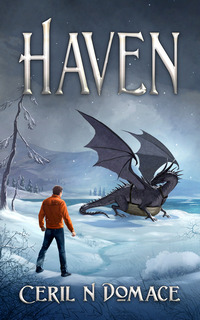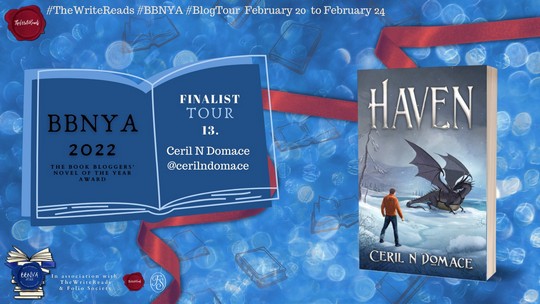 Haven
Haven
DETAILS: Series: The Fae Queen's Court, #1 Publication Date: April 30, 2021 Format: eBook Length: 280 pg. Read Date: February 20-22, 2022

What’s Haven About?
Let’s start with a little background: In a slightly future US, a scientist triggers a sudden mutation in people all over the world matching a certain genetic profile—these people developed certain abilities and displayed physical changes to match. Think X-Men like Beast, Nightcrawler, and Angel. For various reasons, these people take on the generic name of Fae and adopt the names of mythical/fantasy species that line up with their appearances/abilities.
Like every movie and comic book—and common sense—tells us, humans don’t react well to this. In fact, they try to exterminate the Fae. The Fae prefer to live and fight back. Eventually, the war ends and two “reservations” are set up for the Fae to live in. One in northern Canada and one in England. In Europe, tensions ease and the Fae are able to integrate pretty well with humans. In North America, the United States particularly, it gets worse and worse, with vigilantes hunting those newly Changed.
The novel starts fifty or so years after the war on the worst day of Owen Williams’ life. He’s out for a nice evening with his family when everything goes wrong—his wife dies in a traffic accident as he was speeding her to the ER. It turns out that she was in pain because she was beginning to change into a Gryphon. What’s worse—his children have been taken from his home, apparently kidnapped.
Reeling, he’s approached by a Fae who offers Owen a choice. Come along as they smuggle his children to their hidden city for their own safety (it’s likely some or all of his children will Change now) or never see them again. He throws in his lot with the Fae at a time the Cold War between them and the US is starting to heat up.
The Worldbuilding
This is a great piece of worldbuilding—yes, there’s an element to it that feels like The X-Men or Alien Nation or other fantasy series about people thought to be fictional revealing themselves to humanity. But while Domace’s take is familiar, there’s a freshness to it, too.
Also, there’s a reason so many stories are told with a similar framework—it works really well. I’m not criticizing anything by saying it’s familiar, I’m simply describing it.
The differences between the two settlements (we don’t see the UK version, but we hear about it) is a very nice touch. Our focus is on settlement in Canada, Tearmann. It was very well thought out and executed. My favorite thing is that other than what’s required due to physiology (dragons need more space than dwarves, etc.) the city and society is integrated—dwarves live alongside shades and elves. Sure the wolves tend to pack together, but they also are good neighbors.
Quibbles
Please see what I called this section—quibbles. Not “systemic problems” or critiques.
I think this world’s concept of Fae could’ve been introduced better. I hear “Fae,” I think races/species, not mutation. When it was said that Owen’s wife was Changing it threw me—had this been a secret she’d been keeping from him? Could she change back and forth?
His children could’ve been better developed and differentiated earlier—for most of the book, my investment in them was solely based on them being “Owen’s children.” For most of them, that changes by the end. But it takes too long for that (also, I had a hard time keeping them straight because we didn’t get to know them as people). This is fine when it comes to Tiffany, his wife—I’m okay with caring about her solely because she’s his dead wife—she dies so early I don’t need to know much about her (see: Uncle Ben Parker, Scout Finch’s mother, etc.)
One of the quirks of this series is that your fantasy creatures (largely) have everyday names—Jason, Peter, Betty, etc. They’re 0-3 generations away from humans and largely stick with the names they grew up with. This goes down as a plus in my book except for in the beginning—I’m still struggling to figure out what name goes with which of the five Wilson children and I get a Fae team named Jason, Nathan, Tony, Abey, etc. Just so many names flying around without a lot to associate them with. My quibble is only with this being unnecessarily not-easy for the reader.
Lastly, the events of the novel that come after the Wilsons are smuggled out of the country happen too quickly. We’re told the family adapted and fell into a routine after X happens—and then learn that it’d be three days? That’s not time for a comfortable routine for a family of 6. Deep friendships develop far too quickly, etc. (particularly between Owen and the Queen). Change the specifics about days and weeks in this part of the novel, and I wouldn’t have noticed. But they call attention to themselves when they become too difficult to believe.
To sort of take back what I said at the beginning of this section—I guess I have a systemic quibble—Domace needed to give everything more space, let it breathe a little, let the reader as well as the characters, be in the moments a little more so things can develop. I loved the platonic friendship between Owen and the Queen, but it happened too quickly, for example.
So, what did I think about Haven?
I want to stress here that I enjoyed this—but the things I liked are either too specific for a brief post like this or involve spoilers. I spent a lot of space on quibbles because it takes space to explain them. But something like “I loved the platonic friendship between Owen and the Queen,” is just ten words—to say more would ruin the experience for a reader.
Here’s another vague compliment—each Change that happens to a Wilson child is done perfectly—the child’s reaction, the family’s reactions, and the community’s are so great that I wanted to read them again just to see.
There’s a gentle humor shown throughout the book—adding just the right amount of flavor to some descriptions and keeping some dire scenes from being too gloomy. Domace’s descriptions of the people and city of Tearmann are vivid enough to prompt the reader’s imagination to fully see them.
Do I think this book could’ve been better? Sure—most things can. This is book is so close to being very good that its stumbles seem more obvious than others, though.
At the end of the day, I liked this book—and am curious about the sequel, because I think the choices that Domace makes are interesting and I want to see how things get resolved. I recommend this to readers of Mike Chen—it’s a similar mix of SF/F story with family drama (the ratio favors the SF/F than Chen’s typical ratio) as well as all readers who want to see a new and fresh twist on familiar ideas.

This post contains an affiliate link. If you purchase from it, I will get a small commission at no additional cost to you. As always, the opinions expressed are my own.

My thanks to The Write Reads for the invitation to participate in this tour and the materials (including the novel) they provided.






2 Pingbacks